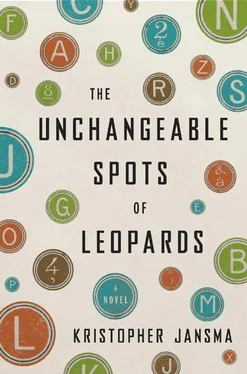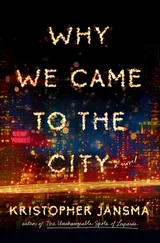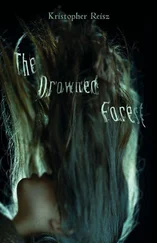“It’s part of my process,” I explained to Mrs. J--. She’s not an unintelligent woman by any means — being an Imperial Princess and all — but she knows nothing about Stanislavsky. “Bring yourself to the part of taking hold of a role, as if it were your own life. Speak for your character in your own person. When you sense this real kinship to your part, your newly created being will become soul of your soul, flesh of your flesh.” I’ve thought of these words many times before, in many dressing rooms, but never have they felt truer to me than on this day. Today I take the role that I will play for the rest of my life. Today I step out in front of the last audience I will ever entertain. I will quicken their breaths. I will make their hearts swell, and break.
Painted on the walls of the dressing room are pink vistas of koi ponds and cherry blossoms and the barren face of Mount Fuji. Next to the table there’s an enormous window, from waist to twenty-foot ceiling, and outside of it the snow is falling much harder than it had this morning. The protesters don’t seem to mind. The Japanese are stoic that way. There are maybe two hundred of them out there, just beyond the walls to the palace grounds, waving signs I cannot read. One or two have my face on them, though. The ministers all said there wouldn’t be a strong showing — a dozen at most. “We Japanese are not like you Americans, in this way,” one said. “We do not get so… ‘rile up’ like you.” But when an American stage actress marries into the Imperial Family tree — even a limb as puny and removed from the Chrysanthemum Throne as Haru’s — it seems to rile them plenty.
I did the math. I’ll be fourteenth in line for the throne. If my husband were killed, and all his brothers and sisters were killed, and all their children and all their children’s children all suddenly met some horrible end, then I’d be the Empress of Japan. Perhaps the protestors think I’m going to pick them all off, one by one, like Richard III, but somehow I don’t think that’s the play that I’m in.
The ladies were whispering about the protestors when they left. “Watashi hasorerani bomu ganaikotowo nozomu!” one of them quietly spoke, releasing a flighty, nervous giggle. I don’t know much Japanese yet — but I know “bomu” means “bomb.”
After the months of classes I’ve taken, I remember mostly the words that they’ve taken from English. As I apply my lipstick, I rehearse the handful I know.
“ Konpyuu-ta … computer. Terebijyon … television. Atommikku … atomic. Bomu … bomb.”
I’m not exactly a hit at parties, yet. But, I’m still learning my lines.
The lips are the most important. The lipstick goes on like oil paint, with a tiny brush of horse’s hair — plucked one at a time from the tail of a steed descended from the horses of Samurai warriors, I’m told. Another brush applies red, and then a black one to outline my eyes, and soon, looking into the mirror, I no longer see myself.
Mrs. Haru J-- looks back at me. An Imperial Princess. Actual royalty. A woman worth a considerable sum. A woman with servants, and a horse-drawn carriage, and a private chef, and a private jet with its own private chef. A woman reviled, and not just by two hundred freezing protestors, but by an entire archipelago of citizens.
Back home they think I am simply marrying for money. Tabloids speculate. Reviewers and critics gurgle in their delight as it drowns them. Who does she think she is? This is not how things are done. How could this woman, whom they’ve loved so from their front-row seats, whose heart they’ve watched beating faster as she kisses sweating, rakish men that they’ve dreamed of being loved by, too — how could she leave and marry some stiff-backed alien? But Haru loves me, just as he loves the roaring passions of the stage precisely because he has never quite experienced them in his Imperial lifetime.
And this, I also understand. I only ever have, once, myself.
Here, though, love has not yet conquered all. Traditions are still important; marriages still arranged. But Haru tells me that the younger generation loves America, and they all want to be Jay-Z and to be in love and drink whiskey and eat bacon cheeseburgers. Atommikku Bomu. Now they sell T-shirts with mushroom clouds on them. I see one out there, in the crowd of protesters now.
Where are the critics when you need them?
I’ve gotten bad press before. Lifeless. Mechanical. Heartless. You shake it off. You prepare for the next role of a lifetime. Mrs. Haru J--, Imperial Princess of Japan. All my life I have only ever been trying to be anyone other than who I am. But each role ends. I can only be Ranevskaya, or Lady Macbeth, or Miss Julie for a few hours before the mystery and elegance slide away and I am only myself again.
There are twice as many people outside now. Why do I keep scanning their tiny faces — half hidden behind scarves? He is not out there.
Stanislavsky suggests using “affective memories”—meaning that the actress should try to recall times when she felt as the character does — to better re-create that emotion upon the stage. And so I think about him — as I do each night before I take the stage. Each night I try to imagine what it was that he wanted from me. What it was that he felt. Some sort of peace. Something I’ve never really felt, myself — except on stage. Maybe on a Christmas morning, twenty years ago. Maybe in those moments before the day begins, when I haven’t yet remembered who I am.
Outside there is a loud cheer. The Imperial Guards are skirting the perimeter. There are cameras and lights now — the cyborg arms of television crews, coming to record this moment, when the people of an island nation are taking a stand. They are angry because their world keeps on shrinking, bound up in fiber-optic nooses, and the more things change, the more they all become the same. In Tokyo as in Manhattan. In Kumasi as in Dubai. In Colombo as in Williamstown. To them I am a corruption. A toxic invader into a once-sacred bloodline. They see it plainly enough— this is the way the world ends. Not with a bang, but with a cancer.
Careful not to crease the folds of my white shiromuku wedding robes, I sit again and reach into my bag. From inside a silk-lined cavity I withdraw
I wake in the morning to find my face plastered to the paper on my desk. I peel this off and bits of words stick to my cheek. I stopped midsentence, it appears. And as I stumble to the sink to wash my face I realize that I cannot, for the life of me, remember what I had intended her to withdraw. I sit staring at the half-finished line for hours, until I hear the sound of the shower going in the next room.
Out of habit, I wander past the closet where I’ve hidden Jeffrey’s manuscript, and, as he sings French opera in the shower, I extract a few pages and read on from where I left off the day before. I’m nearly finished. While it remains devoid of all periods, c ’s, q ’s, w ’s, and z ’s, and it is definitely gibberish, I cannot get past the feeling that it is distinctly Jeffrey’s gibberish. Am I crazy? Or, mixed into this mountain of verbiage, are there specks of gold?
It has crossed my mind, of course, to sell it — surely some collector would pay handsomely for an unfinished manuscript of Jeffrey Oakes’s. It has even crossed my mind to keep it for myself. If I could sift out the gold inside, could I then claim it as my own? But now another idea crosses my mind. I slip the pages back into the wine box where I’ve kept them and put the box into my suitcase and the suitcase back into the closet. Then I lift another sheet of stationery off the top of the pile and write “Jeffrey — Be right back. I’ll get cigarettes. Don’t worry.”
Читать дальше











